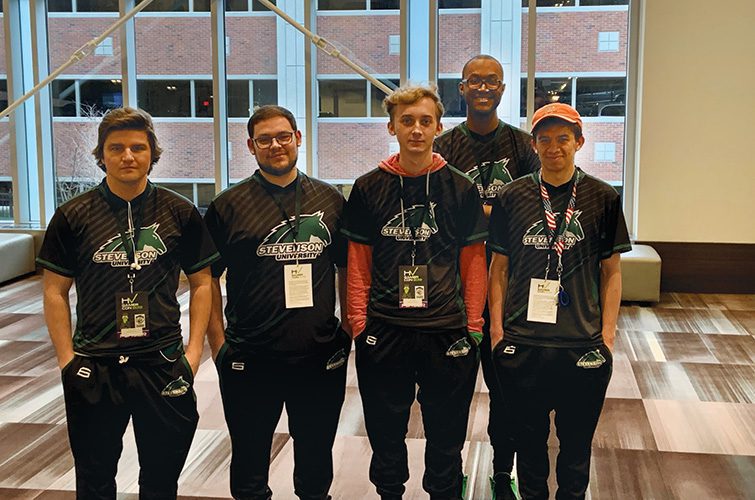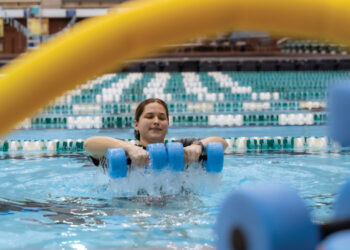At the beginning of 2020, Campus Rec published the article, Finding a Home for Esports, discussing where it belonged on campus. Checking back in, two Campus Recreation directors share updates on the current challenges their esports programs are facing. They also dive into the benefits the programs will continue to bring in the future.
Home Sweet Home
To no surprise over a year later, the industry is still discussing the topic of where esports belongs on campus.
At Stevenson University, Matthew Grimm, the director of Campus Recreation, said his department currently utilizes esports in two different ways. “We have competitive teams that operate similar to club sports and play other schools. Then from an intramural standpoint we do leagues and tournaments for students on campus,” he said.
Since starting their esports program from scratch four years ago, Grimm said a challenge he is seeing now is esports doesn’t exist in just one space or divisional format, resulting in a lack of structure across the board.
“For a lot of schools, esports either falls under athletics, student affairs, campus rec or at some schools, under the IT department,” said Grimm. “There’s also no real divisional format if you think about traditional NCAA sports with multiple divisions. Some schools are giving pretty substantial scholarships and others are just student run with very little support from the university. It needs to be a little more structured than it is right now.”
At Pepperdine University, Robb Bolton, the director of Campus Recreation and Esports, said esports has always been under club sports and he foresees it always will be. “For most schools, it’s going to stay as an intramural or club sport program. For us, that’s the best-case scenario. A club sport can get the full support of the campus rec department,” said Bolton. “We can help with funding, do fundraising and we can advocate for facilities on campus, so it’s equally beneficial for esports to be a club sport right now.”
Grimm also noted facilities and space as important factors when discussing where esports belongs. Previously, the esports team ran into the challenge of accommodating a match and a practice session for different teams in the same space. To combat this issue, the campus rec team dedicated two individual rooms for each need.
Esports Culture
Another controversial aspect of esports is addressing the negative stigmas surrounding the program, including sportsmanship and toxicity in online chats. This is why Bolton’s team is actively working on addressing these issues through Beyond the Game, a mentorship pilot program. They hope to share with and teach local high schoolers and kids the importance of proper conduct and how it will not only help in their esports career but in their careers in general.
“There are internships at some major gaming companies here in southern California that are very sought after. Some of them are so competitive they also look at the backgrounds of the gamers,” said Bolton. “If they’ve ever been flagged for improper conduct or kicked off the game — even when they were young — they are automatically unable to apply for an internship. Kids don’t know this and will make mistakes when they’re young. They try to correct themselves to get on the right path, but they will still be ineligible.”

The pilot program discusses aspects around why conduct matters. Tt ranges from helping kids understand the importance of their gamer tags to chat etiquette. Bolton elaborated esports doesn’t yet have a formal youth sports system. As such, players aren’t exposed to coaching and learning what it means to be a teammate at an early age. He said this won’t change until a more formalized system is in place and negative stigmas are addressed.
“The first team we started, the kids had experience in games but had never been on an esports team. Individually they knew how to play but had never worked with other teammates. That was such an interesting challenge,” said Bolton. “Now that we have started, a culture of kids who are used to being on a team and understand what that means — how they have to take ownership when they make mistakes and communicate directly with somebody — has really changed.”
The pilot program launched in the spring of 2021. Bolton said it’s been successful so far and planned to run the program through the spring semester. “It would be great to let others know so they can adopt the program,” he said. “It’s going to take a lot of mentors to help start to change that culture.”
The Future of Streaming
While there are many esports challenges, there are also great benefits.
Even though Pepperdine University went remote for a large part of 2020 and into 2021, Bolton said esports was one of the only things that wasn’t significantly impacted due to the ability to coordinate and schedule practices and games online using TeamSnap.
Additionally, his team was able to stream many of their events. Because live athletic events were not taking place, the esports team gained a great deal of exposure. In fact, they had over a hundred thousand views on one broadcast.
“If you think about the future of the business side of streaming and the marketing, that’s a lot of views and people are going to want to take advantage of that,” said Bolton. “It will also attract sponsors that were never interested in the university with athletics or other areas because it didn’t fit. We just opened up an opportunity for the university to fundraise and get major donors.”
Investing in streaming will not only create business opportunities, but it can also invest in the futures of students with an interest in a broadcasting career. “There’s a lot of kids who can’t play the game competitively at the level to make the team. Still, they know the game well enough. They can be really good at casting and all the other parts that go into streaming,” said Bolton. “We’re preparing students for a new field that doesn’t have a traditional career pipeline right now.”
Esports is Still Evolving
As with any program, there will be challenges and there will be benefits. Whether you are still looking for a home for your esports program, starting conversations with your teams about culture and conduct, or dipping your feet into streaming, esports is still evolving. There might be a new challenge to tackle each year, but the benefits could be worth it for everyone.
“There’s a lot to benefit from for schools to get over the negative stigma some administers may have regarding what esports is,” said Bolton. “There’s a huge world of opportunity for both students and their careers, and for the university.”










